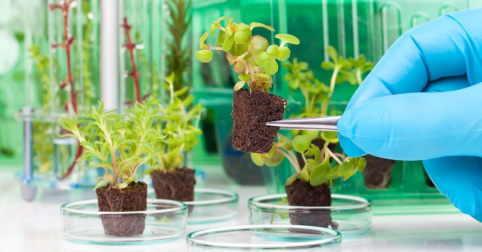Biofilm biofertiliser project offers a low-cost alternative to synthetic fertilisers
An innovative project which aims to provide UK farmers and growers with a sustainable, environmentally friendly nutrient management solution is underway following a partnership between industry experts
The project, called ‘Biofilm Biofertiliser’, will develop a novel multi-species biofilm- based biofertiliser product that reduces the use of synthetic fertilisers by 40-50 per cent. By utilising a unique consortium of UK indigenous biofilm-forming plant growth- promoting bacteria (PGPB), which is tailored to UK soils, it will improve soil quality and plant/crop health, resulting in 20-30 per cent higher yields.
Formulation types include water-dispersible granules (WDG) and encapsulated options, which aims to improve nutrient availability, enhance soil health and foster a stable biofilm with a targeted minimum shelf life of up to 24 months. Following funding from the UK’s innovation agency, Innovate UK, the project is being led by a consortium of partners including lead partner, Bionema Group, a global leader in biocontrol technology developer for crop protection and plant health management; CPI, responsible for the process development and production of samples for the UK field trials, and the UK Agri-Tech Centre, responsible for project management and dissemination/exploitation ensuring awareness raising and end-
user engagement.
As part of this project, three UK farmers and growers in agriculture and horticulture will be provided with a nutrient management solution which offers a low-cost alternative to synthetic fertilisers, improved soil and plant health, increased crop yields by 20-30 per cent and a reduced nutrient run-off. Additionally, the innovative biofilm-based biofertiliser will be produced and manufactured in the UK, reducing reliance on imports from global suppliers. Farmers and growers are facing the challenge of reducing synthetic fertiliser usage as required by law/regulations whilst increasing food production using more sustainable, organic farming methods to meet an ever-rising global demand.
Potential impacts
Bionema’s technology will benefit farmers and growers by improving soil quality, plant health and yields, thus integrating seamlessly into existing farming practises and leading to more sustainable farming, greater resilience and higher profits. There are many economic benefits including generating employment and revenue from new product formulations, established global partnerships and increased export opportunities whilst establishing the UK as a leader in biocontrol technology. Farmers and growers will also be contributing to lower GHG emissions, improved air quality and reduced environmental pollution from nitrogen run-offs. In addition, technology integration will streamline farming practices, promoting sustainable agriculture and resilience whilst the innovation will drive the biocontrol and biofertilizer sector forward, encouraging a shift from synthetic to bio-based solutions. The project aligns with UK and EU regulatory commitments to reduce synthetic fertilisers by 20 per cent by 2030 and supports sustainable development goals (SDGs) such as Zero Hunger, Good Health and Wellbeing, Responsible Consumption and Production and Life on Land.
The project plan
In the earlier stages of the project, partners will focus on developing, optimising and validating formulations for the bacteria consortia, ensuring their stability, efficacy and
ease of application. The two main formulation types to be focused on are WDG and Encapsulation. Lab tests will comprehensively evaluate the effectiveness of WDG and encapsulated
PGPR formulations in promoting plant growth, enhancing nutrient uptake and improving soil and plant health. This evaluation includes measuring seed germination, plant biomass, nutrient uptake, soil microbial activity, soil health indicators and plant stress tolerance under controlled conditions. Later in the project the partners will look at testing formulation sprayability and this work aims to evaluate spray characteristics, droplet size and droplet deposition on leaves from formulations received earlier in the project. The project combines cutting-edge expertise with conventional sprayers to assess spray characteristics and uses new technology to contribute to an innovative approach. During the project, field trials will be conducted for nutrient management with an aim to evaluate WDG and encapsulate biofilm biofertiliser formulations across various crops for efficacy and phytotoxicity at commercial farms over years two and three. The trials will assess strawberries for their yield, quality and health; potatoes for their yield, size and vigour; wheat for its yield, height and disease resistance; and ornamentals for their growth, flowering and aesthetics, compared to existing solutions. Dr Minshad Ansari, CEO and Founder of Bionema Group, as the lead SME partner for the Biofilm Biofertiliser project, said: “The Biofilm Biofertiliser project represents a significant step towards a more sustainable and resilient agricultural future. “By integrating cutting-edge biofilm technology with UK-specific microbial solutions, we empower farmers and growers to reduce their reliance on synthetic fertilisers while enhancing soil health and crop productivity”. “At Bionema, we drive innovation in biocontrol, biostimulants and biofertilisers, ensuring that sustainable farming solutions are effective and economically viable for
farmers and growers. “This collaboration, supported by Innovate UK, brings together the expertise needed to transform nutrient management and set new standards for environmentally
responsible agriculture.” Kris Wadrop, Managing Director Materials at CPI, said: “At CPI, we are committed to driving innovation in sustainable agriculture by supporting the development, scale-up and commercialisation of breakthrough technologies”.
“The Biofilm Biofertiliser project is an exciting opportunity to develop a game- changing solution that enhances soil health and reduces reliance on synthetic fertilisers”.
“By leveraging our expertise in engineering biology, formulation science and advanced manufacturing techniques, we aim to help bring this novel biofertiliser to market, supporting UK farmers in adopting more sustainable and productive farming practices.” Richard Glass, Innovation Lead at the UK Agri-Tech Centre, said: “This project will provide critical support to farmers aiming to increase both the economic and environmental sustainability of crop production by reducing reliance on synthetic nitrogen fertiliser”.
An innovative project which aims to provide







